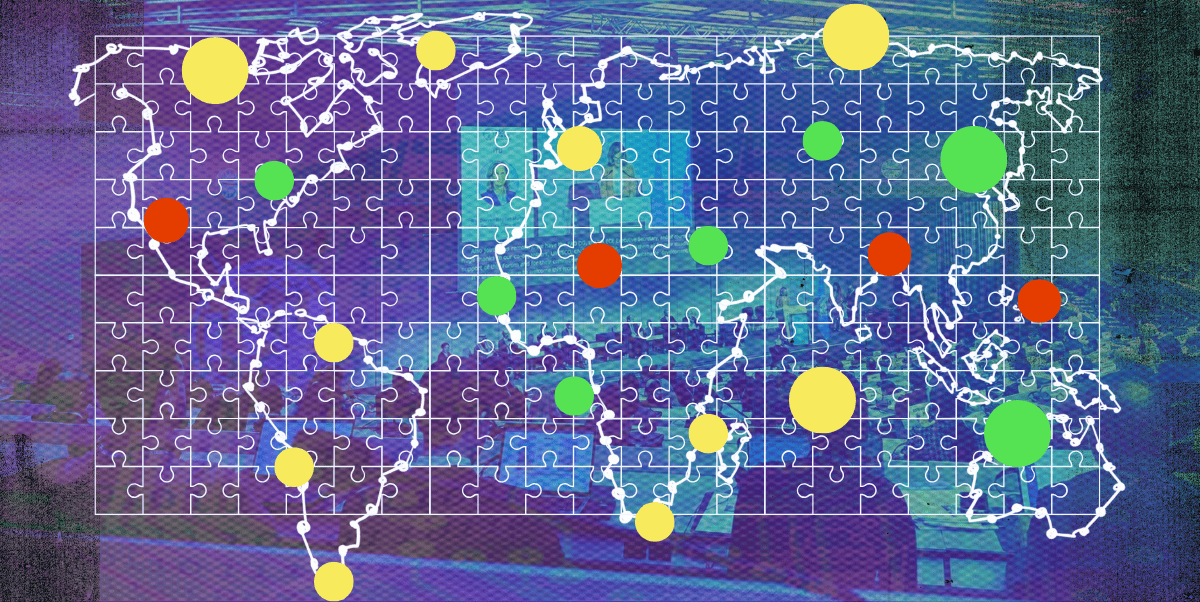Digital Multilateralism in the Age of Turbulence
Dear Reader,
It’s been another whirlwind of a month, with tensions continuing to rise in the realm of global politics. As the proposed 90-day deadline came to a head, the US’s tariff war returned to center stage. With most trade negotiations locked in stalemate, Trump once more announced a slew of unilateral threats, with dozens of countries—including allies like the EU, Japan, and Canada—in the crosshairs. Notably, the tech sector remains a sticking point in many of these cases. Trump has been pushing Europe to roll back its tech regulations for a while, and he explicitly cited Canada’s digital service tax as a target of his efforts. With Brazil, which received a staggering 50% tariff threat, one of Trump's major complaints was the nation’s digital payments system, Pix, which supposedly was “biased against American companies”. With respect to the BRICS bloc, which also met in July, Trump was determined to exercise the sceptre of an alternative digital and financial architecture for facilitating international trade, threatening 100% tariffs for even considering a deviation from dollar supremacy.
The official deadline for trade negotiations has been moved to early August, yet given the vagaries of US policy in recent months, it is anyone’s guess how much of this will come to pass. While the bullying has worked in some instances, such as on Canada’s tech tax, others have remained firm in their defiance. In fact, as commentators have observed, such actions are actually bringing people together in support of national interests and even domestic tech projects.
While the trade war seems to mark a breakdown in consensus for international cooperation, sadly, an old, deeply problematic consensus remains very much in place in other avenues. This was in full view at the fourth International Conference on Financing for Development that took place this month in Seville. A multilateral process that only happens every ten years, the stakes were high for this iteration, especially to address the dire condition of fiscal capacity and debt crises across the Majority World. Yet, as a series of dispatches from critical scholars makes apparent, the outcome of the conference was a renewed commitment to the ‘investible development’ mantra.
Essentially, this amounts to the relegation of public expenditure to a secondary role, meant only to ‘derisk’, and hence, invite private capital to make productive investments. The upshot is not only a continued diminution of public responsibility for development problems but a dynamic in which profiteering companies are to be made the owners of essential infrastructures across the world. Despite acknowledging the continued lack of progress in addressing sustainable development and paying lip service to civil society concerns, the final ‘Compromiso de Sevilla’ ultimately remains wedded to this regressive vision. At a time when international aid is mired in political manipulation to disastrous effect, and the green and digital transitions demand an urgent reallocation of financial flows, such a result can only reiterate the extent to which purveyors of the status quo are blind to all but their narrow self-interest.
Moving to some Big Tech news, the AI race is heating up, with cutthroat competition breaking out within the ranks of Silicon Valley. In July, Meta unveiled a new superintelligence lab, allegedly using compensation packages of hundreds of millions to poach talent from rivals such as OpenAI. This has led to serious recalibrations within the latter, which is also locked in an acrimonious battle with Microsoft over the terms of their partnership. Meanwhile, Microsoft has just managed to nab some high-ranking staff from Google DeepMind as well. Much of this is framed within the industry as a race for ‘Artificial General Intelligence’, the holy grail of tech research these days. Yet, recent surveys indicate widespread skepticism amongst the AI research community about the potential for even achieving such a feat using current approaches to machine learning. So, the dangers of a speculative frenzy without clear, monetizable, end-points continue to haunt Big Tech’s strategic calculus.
Finally, turning to the other main frontier of tech today, the cryptosphere has been gaining rapidly since the passage of Trump’s GENIUS Act, with the industry’s market cap pushing past the 4$ trillion mark for the first time. Simultaneously, there are all kinds of new partnerships springing up between Wall Street and Big Tech to cash in on this wave of public backing. Yet, not only are there unprecedented levels of fraudulent activity still being recorded in the space, but there is also rapidly growing concern about its potential for destabilizing our circuits of finance altogether. Indeed, there have been multiple incisive analyses in recent weeks that spell out the hazards of employing these cryptocurrencies to geopolitical ends, as the Trump administration seems keen to do. What these critiques point out is how, in seeking to upend current economic arrangements for political ends, they also permanently debilitate the capacity for states and central banks to effectively regulate financial activity. In doing this, they threaten to neutralize some of the key levers of democratic control that may still exist for economic reform. Thus, one cannot overstate the importance of countering these measures.
Returning to our edition at hand, this month on DataSyn, we bring you a series of pieces that capture the pulse on multilateral discussions around the digital economy. Our first piece, responding to the ILO’s historic motion to move forward on a convention for platform labor, surveys the broader political economy issues that must inform progressive advocacy on this front. Our second piece moves to the recently concluded WSIS+20 High-Level Event, transmitting dispatches from those on the frontlines of the discussions that took place. Our third piece seeks to contextualize the WSIS process, framing the historical context that highlights its significance for civil society engagement. And as a bonus on a lighter note, our fourth piece catches up with the world of Indian cinema, exploring how the politics of digitalization play out on the silver screen.
The Datasyn Team
PROLETARIAT MATTERS
The Present of the Cross-Border Platform Economy and the Future of Workers - Part One
Shobhit S.
In a landmark decision, the International Labour Organization this year chose to initiate the process for adopting binding standards for platform labor. With the convention scheduled to be agreed upon in 2026, the time is now for shaping the agenda of this crucial multilateral process. To this end, Shobhit S has been working on a detailed study that situates the global push for standards on platform work within the broader political economy of platform capitalism and the North-South divides that characterise it. Have a look at the first part here.
Read on.
THE POLICY TABLE
Dispatches from the WSIS+20 High-Level Event
Various Authors
Marking two decades of vigorous activism, this month’s WSIS+20 High Level Event was a significant milestone for many who have long been in the trenches in the struggle for digital justice. This includes a number of the Global Digital Justice Forum’s members, who continued their determined advocacy agenda, participating in and organizing several sessions in recent weeks. Here, some of them reflect on key takeaways from the WSIS+20 HLE, and what it portends for the future.
Read on.
DIGITAL DISSENT
WSIS and the Movement to Democratise Communication
Sally Burch
In order to understand the significance of the WSIS process, particularly for many activists in civil society, one has to place it in the context of a decades-old social movement and the promise it held out for meaningful change. Having lived this history from the frontlines, seasoned activist Sally Burch recounts some of its key moments and how they frame the stakes of contemporary struggles for digital justice.
Read on.
THE NEW DIVERGENCE
On TAAK: A filmmaker’s view of what privacy means for the working class
Abhineet Nayyar in conversation with Udit Khurana
A new Indian film, TAAK, explicitly delves into the world of wearable tech, exploring how these digital devices are transforming the lifeworlds of workers, making questions of surveillance, exploitation, and privacy salient in strikingly personal ways. Abhineet Nayyar caught up with the director to discuss the inspiration behind the film and his perspective on the fraught trajectory of digitalization that we inhabit.
Read on.
The Sins & Synergies Lounge
Where is the right to innovate in the AI race? Read SOMO’s analysis of the Big Tech dependencies in the Gen AI start-up space for a cutting-edge analysis on what disables competition and diversity in digital markets.
Don’t miss this crucial study by 7amleh on the various forms of gender-based violence affecting Palestinian women.
For a wide-ranging view of AI-related harms, explore this invaluable database on AI Incidents from across the world, spanning various risk domains, distribution of harms, and known AI goals.
For a comprehensive analysis of the motivations and models driving the growing phenomenon of central bank digital currencies, read this insightful paper by S. Yash Kalash.
Read this insightful paper by Dan Ciuriak on the undervaluation of data rents in national economic accounting and trade accounts.
A book to look out for this month is Emily M. Bender and Alex Hanna’s ‘The AI Con’. Watch this insightful discussion of the book with Alex Hanna and Milagros Micelli on the book, the tech industry’s narratives, and what it takes to create the digital futures we want.
Finally, for those working on the conjuncture between tech and contemporary geo-politics, we wanted to flag a special issue by the journal Cambridge Forum on Technology and Global Affairs, on ‘The Impact of Open Technologies in Uncertain Times’. The themed issue looks to foreground key debates and research agendas within this rubric, and submissions remain open till December this year.
Post-script
DataSyn is a free monthly newsletter from the Center for Global Digital Justice, featuring content hosted by Bot Populi. DataSyn is supported through the Fair, Green and Global Alliance.
Have thoughts about what we carried? Want to contribute?
Contact us at newsletter.datasyn@centerforglobaldigitaljustice.org



